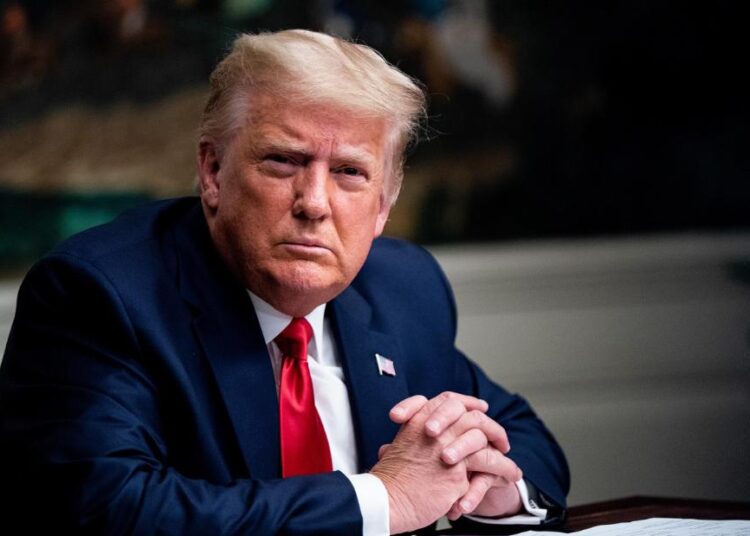(CNN)The Manhattan district attorney’s office has expanded its criminal investigation into the Trump Organization’s finances to include the family’s compound in Westchester County, according to lawyers and people familiar with the investigation.
Manhattan district attorney expands criminal investigation of Trump company to Westchester County property
Prosecutors’ interest in the 212-acre property called Seven Springs is a significant widening of an investigation that began more than a year ago. It also draws closer to President Donald Trump’s son Eric Trump, executive vice president of the Trump Organization, who was directly involved in discussions about the property now under scrutiny, according to court filings.
Prosecutors sent grand jury subpoenas within the past two months to town officials seeking documents and communications that officials had with the Trump Organization relating to development plans it considered for the sprawling family property.
Roland Baroni, a lawyer for the town of North Castle, New York — one of three municipalities that the property straddles — confirmed the town received a subpoena “asking for the planning board files, any correspondence, any email” exchanged between the town and the Trump Organization. He told CNN that the town complied with the request and that prosecutors have not sought to interview any officials.
The Trump Organization has also been subpoenaed for information related to the property and tax deductions it took after donating a conservation easement to a public trust, according to people familiar with the investigation.
The criminal investigation poses a significant threat to Trump, his business and his family as he leaves the White House next week and will no longer have the shield of the presidency to delay or postpone lawsuits and investigations.
The President personally signed the conservation easement in his thick Sharpie marker, according to documents CNN obtained through a public records request.
The Seven Springs property is also part of a civil investigation conducted by the New York attorney general’s office, which has said it is looking into whether the Trump Organization “improperly inflated” the value of the Seven Springs estate.
The Trump Organization acquired the property in 1995 for $7.5 million. It was once owned by the father of Katharine Graham, the former publisher of the Washington Post.
Over the ensuring years, the organization made several attempts to develop on the property. Initially there were discussions to build a golf course on the grounds and then plans to build a subdivision of residential homes.
Those efforts were dropped, and by 2015, the Trump Organization decided to donate a conservation easement to a land trust. A conservation easement is a designated portion of the property that is preserved and not developed. By making a donation, it allows the donor to take a tax deduction based on the appraised value of the property. If it were improperly inflated, the donor could take a larger tax deduction than is allowed.
Trump granted a conservation easement of about 158 acres to the North American Land Trust, according to court filings. It was appraised at $21.1 million, according to the filings.
Investigators are scrutinizing the valuation and whether it was inflated.
“Valuations of Seven Springs were used to claim an apparent $21.1 million tax deduction for donating a conservation easement on the property in tax year 2015, and in submissions to financial institutions as a component of Mr. Trump’s net worth,” according to court filings in the New York attorney general’s investigation.
Baroni, the lawyer for North Castle, said the Manhattan district attorney’s subpoena sought the same records that the New York attorney general had previously requested.
The district attorneys’ office, led by Cyrus Vance, is investigating whether the Trump Organization violated any state laws, which could include tax fraud, insurance fraud or other schemes to defraud.
Prosecutors subpoenaed Deutsche Bank, which has loaned Trump more than $300 million, and AON, an insurance broker, and interviewed some employees at those firms. They also interviewed Michael Cohen, the President’s former personal attorney, who told lawmakers that Trump inflated or deflated the value of his assets when seeking loans from lenders, insurance or to obtain favorable tax treatment.
In the fall, prosecutors subpoenaed the Trump Organization for records relating to fees it paid to consultants, including a payment made to a company controlled by the President’s daughter, Ivanka Trump, according to people familiar with the matter.
Mazars USA, the President’s long-time accountant, was also subpoenaed for eight years of the President’s personal and business records. Trump sued to block it and the subpoena has been tied up in court and is back before the Supreme Court.
The litigation has delayed prosecutors from taking key investigative steps, multiple sources say, including contacting Trump’s personal banker or seeking interviews with any employees of the Trump Organization.
Carey Dunne, general counsel for Vance’s office, told a judge in July that the subpoena delay has led to “continuing concerns about the potential loss of critical evidence and expiration of statutes of limitations.”




